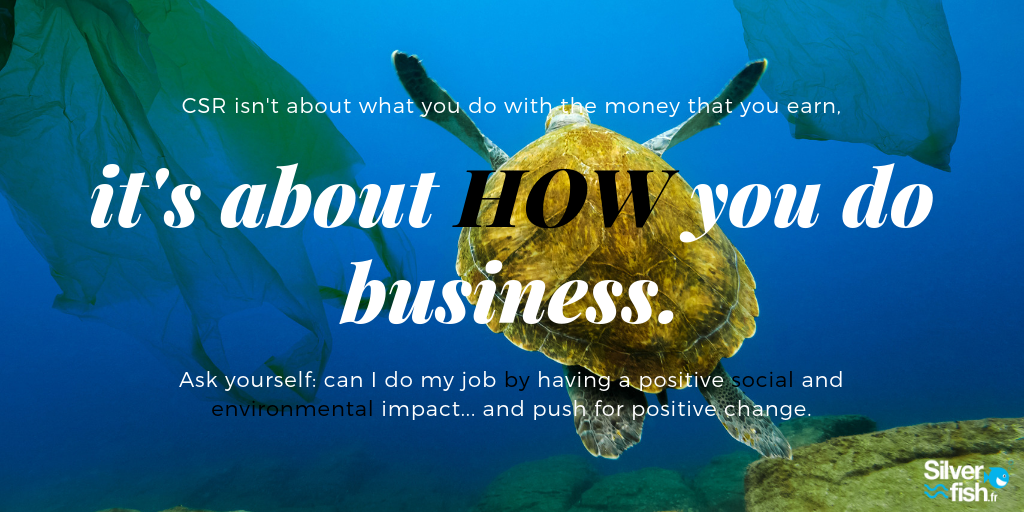The world of business is coming under greater public and political scrutiny than ever before. Companies must act now to ensure a positive environmental and social impact, or risk having involuntary measures imposed upon them, says Silverfish CSR director Laura Da Silva.

Laura da Silva Gomes, Founder and Director, Silverfish CSR
Laura spoke at the IRM UK Business Change & Transformation Conference Europe 18-20 March 2019, London. Laura presented the keynote, ‘Sustainable Change: Diversity and Beyond‘.
The next IRM UK Business Change & Transformation Conference Europe will be held 16-18 March 2020, London
The world is increasingly socially & environmentally aware. People that see something they do not like are now more likely to act to show their discontent, often prompting politicians and regulators into action. Whether it’s the billion-dollar fines being levied on tech giants, widespread condemnation of the working practices of taxi or delivery apps, or climate protestors shutting down central London, the evidence is clear to see.
Corporations do bear the brunt of this, but perhaps with good reason. For too long even established companies have failed to proactively manage their impact on society. Many argue that they have complied with laws and regulations – but these are a set of minimum standards; if all companies aim for nothing more than compliance it’s effectively a race to the bottom.
After all, corporate social responsibility is not a compliance or branding exercise. It’s not a series of boxes to be ticked. Instead it’s a way to set out foundations to ensure a business has positive social, environmental and commercial impact.
The issue is that no two CSR strategies are the same. Just as every company is different, every company’s blueprint for a positive impact will be different. However, there is a way to work out the best fit for your business.
1. Define what CSR or sustainability mean to your business in partnership with your key stakeholders: Ask yourself what it actually means to your brand, employees, investors, customers and other relevant groups. What is your impact on and therefore objectives for your business, society and the environment?
2. Think about your business model: It isn’t about what you do with the money that you earn, but how you earn that money. Savvy businesses will find a way to exist in a way that has a positive impact rather than presenting what they do as something that has a positive impact. Everyone in a business has the responsibility to ask questions such as “is there a way that I do my job, reach the objectives, by having a positive social and environmental impact“. It is rarely the easiest way. It is almost never “how it’s always been done“. But with enough creativity and motivation, it is always possible.
3. Measure the impact – and don’t be scared to ask for help: Work out a way to present your CSR strategy in the simplest terms and set out key metrics with which to measure how effective it is. For example, say you want to eliminate plastic use in your company – state that is your goal and by when. Publicise both your goals, and how close (or far) you are from reaching them. Don’t just publicise the successes while trying to hide the failures. Admit your mistakes. Ask stakeholders for help and guidance on how to improve. Honesty and transparency are rewarded. There is no place to hide anymore. Employees, customers and other groups are starting to speak up so give authenticity a try. You will be rewarded for it. You’re not expected to be perfect, but it is expected that you will try to be better.
Very often, clients will ask me for an example of a business doing it right. The truth is no business is perfect. All will have flaws, areas in need of improvement, and issues to be ironed out. There are some that have impressed me, however. One particular favourite is the clothing brand Patagonia.
Its core mission statement is: “We’re in business to save our home planet.” The company describes its reason for being: “At Patagonia, we appreciate that all life on earth is under threat of extinction. We aim to use the resources we have—our business, our investments, our voice and our imaginations—to do something about it.” You can read more about how the company is built on positive impact here: https://www.patagonia.com/the-activist-company.html
Even then, it is not perfect. In 2011, internal audits of its supply chain discovered instances of forced labour and exploitation in its supply chain. The company quickly moved to address these issues. But crucially, it publicly admitted that there was an issue, and one they would act to address. Companies placing the social and environmental impact at the core of their business strategy are few. However, whatever our role or our seniority, we all have a level of influence. And we need to start by asking questions. Showing others that we care, and that the sustainability of our planet is everyone’s responsibility.
Laura Da Silva Gomes is the founder and director of Silverfish CSR Ltd, a company that specialises on Innovation and Corporate Social Responsibility. She has worked closely with companies all over the world, from France to New Zealand, from South Africa to Canada, in multiple languages to look at how to improve their positive impact on society. She is also involved in a project that aims at protecting an island in the Indian ocean while making it sustainable from a financial, environmental and human perspective.
Copyright Laura da Silva Gomes, Founder and Director, Silverfish CSR


